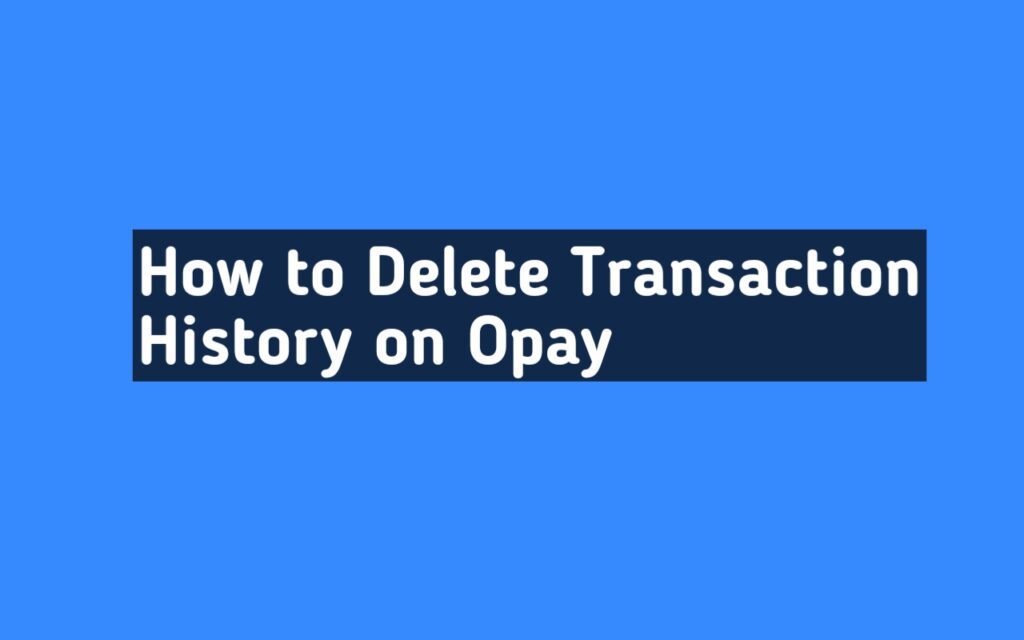Opay is a popular mobile payment service in Nigeria that allows users to send and receive money, pay bills, and more. It’s become very popular for its convenience and ease of use.
However, one question many Opay users have is “Can I delete my transaction history on Opay?”
The short answer is no, you can’t delete individual transactions or your full transaction history on Opay. But why not?
In this detailed guide, we’ll explain:
- Why Opay doesn’t allow deleting transaction history
- The security and privacy reasons behind this policy
- What you can do to maintain your privacy within these limitations
- Pros and cons of Opay’s approach to transaction data
By the end, you’ll understand why you can’t delete transactions on Opay or any other mobile money service.
Why You Can’t Delete Transaction History on Opay
The main reason Opay doesn’t allow users to delete their transaction history is for security and fraud prevention purposes.
Opay is regulated as a financial service in Nigeria. As such, they must comply with financial regulations like storing transaction records and making them available in case of any disputes, investigations or audits.
Deleting transaction history would enable fraudulent activities like money laundering, terrorist financing or other financial crimes. That’s why no mobile money or bank app allows you to delete transactions once they are processed.
Also, retaining transaction data allows Opay to:
- Resolve any payment disputes
- Assist law enforcement if necessary
- Troubleshoot technical issues
- Analyze usage patterns to improve their services
Essentially, storing transaction history is a standard practice in finance and helps maintain the integrity and security of the payment system.
The Privacy and Security Advantages
While some users may be uncomfortable with Opay keeping all their transaction data, there are some privacy and security benefits to this policy:
- You have an automatic record of your spending history which acts as a digital receipt of everything you do in Opay. This can help you track expenses, budget better and catch any unauthorized activities.
- Opay keeps your financial information private and secure. They have strong data security protections in place to prevent hacks or leaks. Only you can access your full transaction details.
- If your account is ever compromised, the record of your legitimate transactions helps resolve things faster. You have proof to show which transactions were fraudulent versus your real activity.
So in many cases, having a permanent record of your financial history on Opay actually protects against privacy and security violations.
What You Can Do to Maintain Privacy
While deleting transactions isn’t an option, there are still a few things you can do to protect your privacy within Opay’s system:
- Use multiple Opay accounts for different purposes like personal spending, business, savings etc. This segments your transaction history.
- Withdraw cash to make untraceable payments if you want to limit your digital footprint. Opay only records the withdrawal, not what you spend the cash on.
- Use Opay aliases or codes when transferring to contacts to mask their real identity.
- Turn off transaction notifications so your activity isn’t visible on your phone. Check your history manually when required.
- Set up account passwords or device locks so only you can access your Opay app and transaction details.
- Monitor your account regularly to catch any unauthorized activity promptly. Report issues to Opay as soon as possible.
While not perfect workarounds, these tips can help anonymize some of your Opay activity. But within the system, permanent records are a fact of life.
Pros and Cons of Opay’s Transaction Data Policy
Here’s a quick rundown of the main advantages and disadvantages of Opay’s policy for users:
Pros:
- Enhanced security and fraud prevention
- Dispute resolution support
- Technical troubleshooting assistance
- Data to improve products and user experience
- Transaction records and receipts for your own reference
Cons:
- Lack of transaction privacy from Opay
- No ability to delete potentially sensitive payments
- Risk of government/law enforcement access to your data
- Possibility of data breaches exposing your records
Overall, for most users the security benefits likely outweigh the minor privacy tradeoffs. But it depends on your specific needs and preferences around financial data.
Conclusion
To summarize, deleting individual transactions or your full history is not possible on Opay due to regulatory requirements around retaining financial records. While some privacy is compromised, this policy provides significant security and fraud prevention benefits.
Hopefully this guide has helped explain clearly why erasing transaction data is not an option on Opay or any other mobile money platform. The records must be maintained for valid legal and security reasons. But a few wise habits can still help you protect sensitive information within the system.
So if you were wondering “How do I delete my transaction history on Opay?”, now you know it simply can’t be done. Maintaining comprehensive activity logs is crucial for the integrity of any financial service. With care, you can still minimize unwanted visibility into certain transactions. But complete deletion just isn’t feasible under current regulations.
